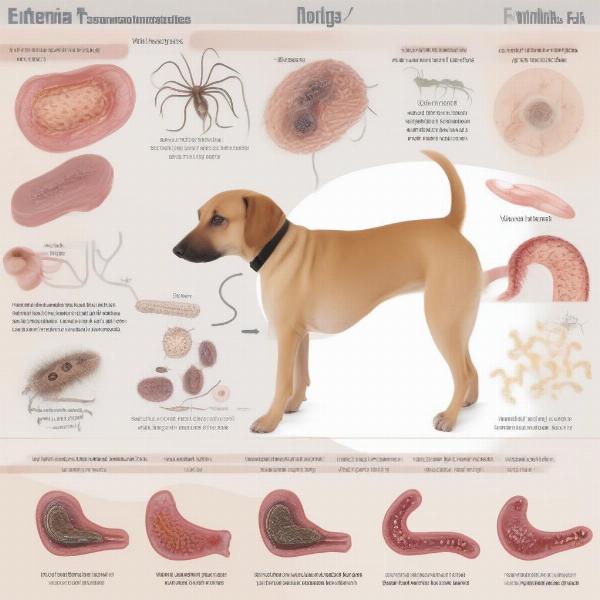Paradefense, short for parasite defense, is crucial for maintaining your dog’s overall health and well-being. Parasites, both internal and external, can cause a range of problems, from mild discomfort to serious illness. Understanding the different types of parasites, prevention methods, and treatment options is essential for every responsible dog owner.
Understanding the Threat: Types of Dog Parasites
Dogs are susceptible to a variety of parasites, each posing unique threats. These can be broadly categorized into internal and external parasites. Internal parasites live inside the dog’s body, affecting organs such as the intestines, heart, and lungs. Common examples include roundworms, hookworms, whipworms, tapeworms, and heartworms. External parasites, on the other hand, infest the dog’s skin and coat. Fleas, ticks, mites, and lice are common external parasites that can cause itching, skin irritation, and even transmit diseases.
 Internal and External Dog Parasites
Internal and External Dog Parasites
Preventing Parasite Infestations: Proactive Measures for Your Dog
Prevention is always better than cure when it comes to parasites. Several proactive measures can significantly reduce your dog’s risk of infestation. Regular deworming, typically starting from puppyhood, is essential for controlling internal parasites. Your veterinarian can recommend the appropriate deworming schedule and medication based on your dog’s age, breed, and lifestyle. For external parasites, a variety of preventative treatments are available, including topical solutions, oral medications, and collars. Choosing the right product depends on your dog’s individual needs and the prevalent parasites in your area.
Recognizing the Signs: Symptoms of Parasite Infestation in Dogs
Early detection of parasite infestation is key to effective treatment. While some parasites are easily visible, others may manifest through subtle symptoms. Common signs of internal parasites include vomiting, diarrhea, weight loss, lethargy, and a pot-bellied appearance. External parasites often cause excessive scratching, biting, hair loss, and skin irritation. If you notice any of these symptoms, consult your veterinarian for a proper diagnosis and treatment plan.
Treatment Options: Addressing Parasite Infestations
Treatment for parasite infestations varies depending on the type of parasite involved. Your veterinarian will conduct a thorough examination and may recommend fecal tests, blood tests, or skin scrapings to confirm the diagnosis. Treatment options include oral or topical medications, injections, and in some cases, even surgery. Following your veterinarian’s instructions carefully is crucial for successful treatment and preventing re-infestation.
Maintaining a Parasite-Free Environment
In addition to direct treatments and preventative measures, maintaining a clean environment is crucial for minimizing the risk of parasite infestations. Regularly cleaning your dog’s bedding, food and water bowls, and living areas can help eliminate parasite eggs and larvae. Promptly cleaning up dog feces in the yard also plays a vital role in breaking the parasite life cycle.
Conclusion
Paradefense is a continuous effort that requires vigilance and proactive measures. Understanding the types of parasites that can affect your dog, recognizing the signs of infestation, and implementing preventative measures are essential for protecting your furry friend’s health. Regular veterinary check-ups and following a tailored parasite prevention plan are key to ensuring your dog lives a long, healthy, and parasite-free life. By staying informed and taking proactive steps, you can provide your dog with the best possible paradefense.
FAQ
- How often should I deworm my dog? This depends on your dog’s age, lifestyle, and risk factors. Consult your veterinarian for a personalized deworming schedule.
- What are the best flea and tick prevention products for dogs? There are many options available, including topical solutions, oral medications, and collars. Your veterinarian can recommend the best product for your dog’s specific needs.
- Can humans get parasites from their dogs? Yes, some parasites can be transmitted from dogs to humans. Practicing good hygiene and following your veterinarian’s recommendations can minimize this risk.
- How can I tell if my dog has heartworms? Heartworm disease can be difficult to detect in the early stages. Regular veterinary check-ups and preventative medication are crucial.
- What should I do if I think my dog has parasites? Contact your veterinarian immediately for a proper diagnosis and treatment plan.
- Are there natural remedies for dog parasites? While some natural remedies may offer some benefit, it’s essential to consult your veterinarian before using them, as they may not be effective or safe in all cases.
- How can I prevent my dog from getting parasites while traveling? Talk to your veterinarian about preventative measures specific to your travel destination.
ILM Dog is a leading international online resource dedicated to providing dog owners with expert advice and practical tips on all aspects of dog care. From breed selection and health care to training and nutrition, we offer comprehensive guidance to help you provide the best possible care for your canine companion. We specialize in various areas of dog care, including health and medical care, training and behavior, and products and accessories. If you’re looking for reliable information and expert advice on paradefense or any other aspect of dog care, visit ILM Dog. Contact us at [email protected] or +44 20-3965-8624 for personalized guidance.